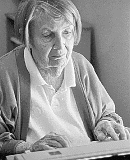WRITING DOWN THE DECADES
by Sharon Barett
It was 1974 and Barbara Corcoran was in Kansas meeting a group of children who were fans of her many books for young readers. One of the things she vividly remembers from that meeting is this:
“A pigtailed girl ran up to me and said challengingly, ‘You an author?’”
“I admitted that I was.”
“‘I don’t believe it,’ the girl replied.”
“Why not?”
“‘Cause,’ she said with complete certainty. ‘Authors are dead.’”
Move ahead twenty-four years to June 1998. Corcoran, now eighty-seven, is a featured participant on “A Quality of Life’s End,” a weeklong series on Montana Public Radio, not because of her age, but because she is very much an author and very much alive. Every day of the series, her work can be heard on KUFM’s children’s radio program, “The Pea Green Boat.” The story called “Jordan” is one that she adapted at the request of the series director from her young adult novel, May I Cross Your Golden River?
That novel, which deals with a sixteen-year-old boy dying of Lou Gehrig’s disease, is one of seventy-two novels-yes, seventy-two-for middle-grade to high-school readers Corcoran has written since she received a master’s degree in English in 1953 from The University of Montana.
Originally from Massachusetts and a Wellesley graduate, Corcoran spent a number of years pursuing, without much success, her first loves-theater and playwriting. Then on a later visit to Montana, she met with H.G. Merriam, head of the University’s English department. “I wanted to know if it would be absurd for a forty-two-year-old woman to enroll in the graduate school,” she says.
The English department faculty included Walter Van Tillburg Clark, “the author of one of my favorite novels, The Ox-Bow Incident,” Corcoran recalls. “Walter Clark was a wonderful teacher, and the cla
sses I took with him initiated the change in my writing that steered me toward some success at last.”

A sampler of awards for Barbara Corcoran’s books:
• A Western Writers of America award for Wolf at the Door.
• The Child Study Association’s Book of the Year Award for The Long Journey.
• The William Allen White Children’s Book Award for Sasha, My Friend.
• A Pacific Northwest Booksellers award for general excellence.
• A National Science Teachers Assoc- iation award for Summer of the White Goat and The Young Grizzly.
Corcoran’s recollections of the controversial critic and essayist Leslie Fiedler, who replaced Merriam as department chair, are not quite as pleasant. For her thesis, she wrote “a giddy little comedy about faculty life called Two-thirds of a Ghost.” It was performed on campus and “everyone loved it, including Mrs. Fiedler”-everyone except “Dr. Fiedler, who never gave us a smile.” She then submitted the play to a national contest at the Samuel French Play Co., where it won second place and $350.
Years later, Corcoran says she tried to capture this 1953 campus in a book called Sasha, My Friend. That book is a perennial favorite of young readers.
Another favorite is Sam, Corcoran’s first novel, which was published in 1967. She had intended this coming-of-age novel for adults, but an editor at Atheneum thought it was perfect for children. So Sam became what Corcoran calls her “accidental entry” into writing and was followed by a long list of titles.
Sam, which depicts the Flathead Lake area, is one of many books whose settings were inspired by Corcoran’s love of Montana. Don’t Slam the Door When You Go, for example, is set in a Montana ghost town modeled after Garnet. A Horse Named Sky centers on Lolo, and her most recent book, Wolf at the Door, published in 1993, takes place near Flathead Lake.
Corcoran says she enjoys writing for young adults because, as an author, “you have a closer relationship with your readers. Their response is immediate.” It is also an interesting age, she says, because young adults are dealing with lots of conflicts about their families and their futures-conflicts that have not really changed over the years.
What has changed are the kids. “I have written for two generations now,” Corcoran says, “and anyone who speaks disparagingly of today’s kids has me to battle. They are in my opinion smarter, more receptive to ideas, more responsible than the average group of children in my generation ever was.”
Corcoran’s prolific outpouring of work-which includes books translated into German, Spanish, Swedish and a variety of other languages-has earned her a variety of regional and national awards (see box). In 1992, Corcoran received UM’s Merriam Award, named for the man who nearly four decades earlier had believed it was not “absurd” for a middle-aged woman to enroll in graduate school.
As for authors, living or dead, Corcoran, who is at work on her memoirs, says, “My own opinion is that an author isn’t dead as long as one child reads one book of hers. Or remembers one little insight from that book.” M
Sharon Barrett is a professor of journalism.![]()